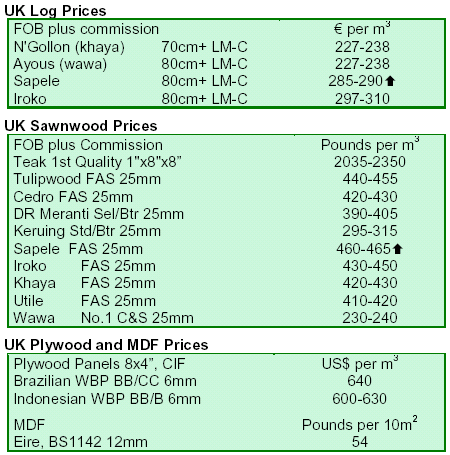|
Report
from the UK
UK furniture sector may be hit in 2008
Some experts have indicated that the furniture sector is likely to underperform in 2008, said TTJ. Oxford
Economics has forecast that furniture would rise in volume only 1.7% in value and 0.1% in volume next
year, and said that the 2008-2011 period would increase on average of 1.9% in volume and 3.5% in
value. From January ĘC August 2007, sales fell 2% compared to the same period in 2006. Experts
expect that without price changes, the volume of second quarter spending in 2007
will be 2.9% lower than the previous quarter. New figures show that furniture imports have grown during the second
quarter of 2007 by 2.2%, even though demand fell.
TTJ Wood Futures Conference highlights challenges of green building
TTJ Wood Futures Conference hosted a number of speakers on green building. A representative from
Travis Perkinsí» explained the demands of the company to meet certification requirements and broader
green credentials given government targets requiring new homes to be í«sustainableí» and emit í«zero
carboní». A representative from TRADA also pointed to the demands on traders,
noting that traders can show they are eco-friendly by learning from the latest codes being developed in
Westminster and Brussels.
UK demand for hardwoods wanes amidst supply and logistics problems
TTJ analyzed the recent hardwoods situation in the UK, saying that booking space on vessels,
especially from the Far East, had complicated purchases. It also noted that
prices for Cote dí»Iviore framire rose due to tight supply, largely caused by buyer preferences to process iroko at
higher margins. Additionally, the UK market continues to demand keruing thin boards, which are in short
supply, and are considering using kapur as an alternative. Finally, Brazilian hardwoods used for decking are being demanded
at firm prices, due to the weak dollar, although demand has been weak since the
summer months.

EUROPE
MARKET and Scandinavia
High prices for Indonesian plywood result in searches
for alternative markets
EUWID said the price difference between Indonesian and Chinese plywood has narrowed in recent
weeks. While many inquiries for Indonesian products have been made, the inquiries do not usually
result in firm orders. Moreover, as Malaysian prices for raw plywood are sold at
a lower price than in Indonesia, importers are substituting raw Malaysian plywood for Indonesian plywood.
Demand for African lumber falls
Demand for African lumber in Europe has yet to recover from the lows experienced during the summer holidays,
reported EUWID. Part of the falling demand is due to better availability of meranti, for which
sales have risen due to the falling US dollar. Importers report that receipts
for African lumber are lower than in 2006. Specific deliveries of sapele have been delayed, demand for sipo
has fallen, and procurement for good-quality wawa has become difficult due to the ongoing flooding. However,
due to the possible EU ban on Myanmar teak, iroko lumber is being used as a substitute, resulting in rising
prices for the species. At present, German importers have not increased prices in the last few weeks,
despite rising conventional shipping costs.
German demand slows for bangkirai and meranti
German importers have reportedly decreased their contracts for bangkirai decking, said
EUWID. Contrary to importersí» behavior during last yearí»s Ramadan period,
buying has not increased for bangkirai decking in 2007, since last year buying activity was heavy but supply failed
to sell in summer 2007. Similarly, contracts for meranti lumber and laminated meranti scantlings are being ordered
in low quantities. Low qualities of both bangkirai and meranti are not selling well and importers are looking for
higher-quality materials to maximize profits.
In anticipation of the fall of demand and the recent Ramadan holiday, some Southeast Asian suppliers
have cut back production in mid-October, resulting in limited supply for buyers. EUWID reported that
there were fears that shippers might negotiate too low contracts due to the
available supply, which would result in a bottleneck when supply picked up. At present, Indonesian and Malaysian
shippers have not reduced their prices for meranti and bangkirai and have even asked for higher prices due to
rising freight costs. Prices for 2008 are largely stable at present. In Germany, however, high stocks
have negatively impacted sales prices for large scale buyers of meranti and
bangkirai.
|